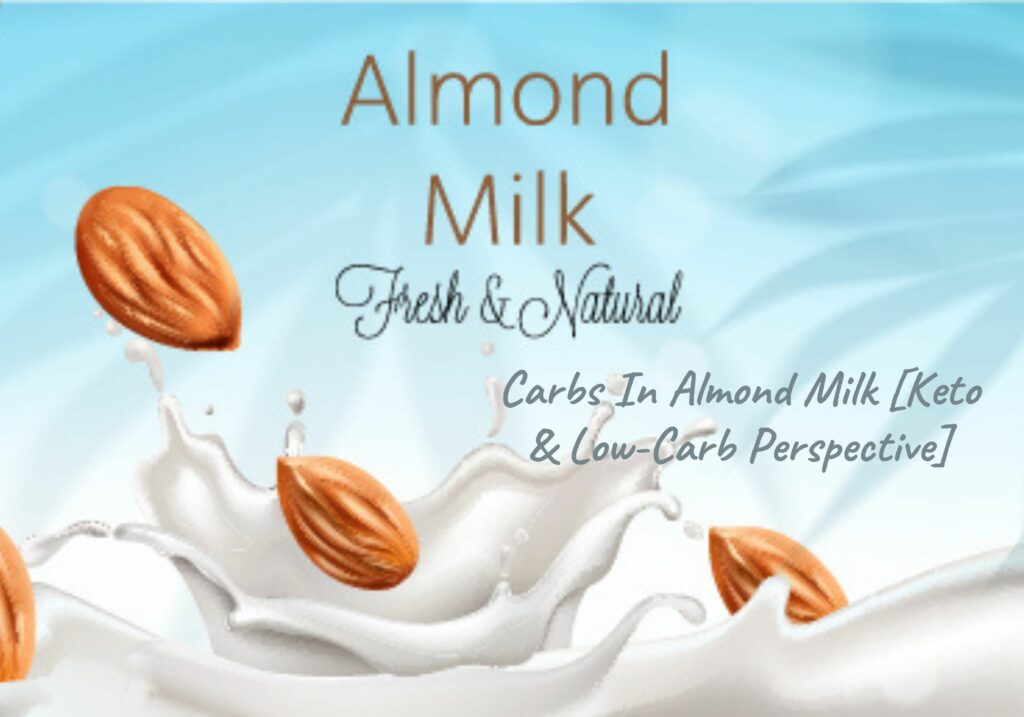
Almond milk is a popular alternative to dairy milk and is often used in ketogenic and low-carb diets. When considering whether almond milk is keto-friendly or not, it’s important to look at its carb content.
One serving of unsweetened almond milk typically contains 1-2 grams of carbohydrates, which is significantly lower than the 12-13 grams of carbohydrates found in one serving of dairy milk. This makes almond milk a great option for people following a low-carb or ketogenic diet, as it won’t greatly impact their daily carb intake.
However, it’s worth noting that not all almond milk is created equal. Some brands add sweeteners or other ingredients that increase the carb content, so it’s always important to check the label before purchasing. For a keto-friendly option, look for an unsweetened almond milk with no added sugars or sweeteners.
In addition to its low carb content, almond milk is also a good source of healthy fats, which are important on a ketogenic diet. It’s also high in vitamins and minerals, making it a nutritious addition to your diet.
In conclusion, is almond milk keto? The answer is yes, as long as it’s unsweetened and without added sugars or sweeteners. With its low carb content and healthy nutrient profile, almond milk can be a great option for those following a ketogenic or low-carb diet. Just remember to always check the label before purchasing to ensure you’re getting a keto-friendly option.
How Many Carbs Are There in Almond Milk? Nutrition Facts
Almond milk is a popular alternative to dairy milk and is often used in ketogenic and low-carb diets. When considering whether is almond milk keto, the carb content of almond milk is an important factor to consider.
One serving of unsweetened almond milk typically contains 1-2 grams of carbohydrates. This amount is significantly lower compared to the 12-13 grams of carbohydrates found in one serving of dairy milk. This makes almond milk a great option for those following a low-carb or ketogenic diet, as it won’t greatly impact their daily carb intake.
However, it’s important to keep in mind that not all almond milk is the same. Some brands add sweeteners or other ingredients that increase the carb content, so it’s always crucial to check the label before purchasing. To ensure you’re getting a keto-friendly option, look for unsweetened almond milk with no added sugars or sweeteners.
In addition to its low carb content, almond milk is also a good source of healthy fats, which are an important aspect of a ketogenic diet. It’s also high in vitamins and minerals, making it a nutritious addition to your diet.
In conclusion, when it comes to the question of is almond milk keto, the answer is yes, as long as it’s unsweetened and without added sugars or sweeteners. With its low carb content and healthy nutrient profile, almond milk can be a great option for those following a ketogenic or low-carb diet. Just remember to always check the label before purchasing to ensure you’re getting a keto-friendly option.
Currently Available Store-Bought Almond Milk Has Lower Fat and Sugar Content

Almond milk has become increasingly popular as a dairy milk alternative, especially for those following a ketogenic or low-carb diet. With this in mind, it’s important to consider the fat and sugar content of store-bought almond milk to determine if is almond milk keto-friendly.
Currently, most store-bought almond milk brands have lower fat and sugar content compared to dairy milk. One serving of unsweetened almond milk typically contains 2-3 grams of fat and 1-2 grams of sugar, compared to the 8 grams of fat and 12-13 grams of sugar found in one serving of dairy milk. This makes almond milk a better option for those following a ketogenic or low-carb diet, as it won’t greatly impact their daily fat and sugar intake.
However, it’s worth noting that some almond milk brands add sweeteners or other ingredients that increase the sugar content. It’s always important to check the label before purchasing to ensure you’re getting a keto-friendly option. Look for unsweetened almond milk with no added sugars or sweeteners for the best results.
In addition to its lower fat and sugar content, almond milk is also a good source of healthy fats, which are an important aspect of a ketogenic diet. It’s also high in vitamins and minerals, making it a nutritious addition to your diet.
In conclusion, is almond milk keto? The answer is yes, as long as it’s unsweetened and without added sugars or sweeteners. With its lower fat and sugar content, and healthy nutrient profile, almond milk can be a great option for those following a ketogenic or low-carb diet. Just remember to always check the label before purchasing to ensure you’re getting a keto-friendly option.
Make Almond Milk At Home to Ensure Quality
Making almond milk at home is a great way to ensure its quality and make sure that it fits in with your ketogenic or low-carb diet. When considering is almond milk keto, it’s important to have control over the ingredients that go into it.
By making almond milk at home, you can control the amount of sweeteners and other ingredients that are added. This means that you can make a keto-friendly version by using only unsweetened almonds and water. No added sugars or sweeteners means that you can keep the carb content low, making it a great option for those following a ketogenic or low-carb diet.
In addition to control over the ingredients, making almond milk at home also allows you to control the texture and consistency. You can choose to make a thicker or thinner version, depending on your preference. This is a great way to personalize your almond milk to fit your needs and tastes.
Making almond milk at home is also a cost-effective option compared to purchasing it at a store. All you need are almonds and a blender or food processor, and you can make your own almond milk in just a few minutes.
In conclusion, is almond milk keto? Making it at home is a great way to ensure that it is. By having control over the ingredients and texture, you can make a keto-friendly version that fits in with your diet. Not only that, but making almond milk at home is also cost-effective and a fun way to get creative in the kitchen.
Almond Milk On a Low-Carb Diet
Almond milk has become a popular choice for those following a low-carb diet, but it’s important to consider its nutritional profile to determine if is almond milk keto-friendly. A low-carb diet typically involves limiting carbohydrate intake to a specific number of grams per day to promote weight loss and improve health.
When considering is almond milk keto, it’s important to note that one serving of unsweetened almond milk contains approximately 1-2 grams of carbohydrates, which is significantly lower than the 12-13 grams of carbohydrates found in one serving of dairy milk. This makes almond milk a good option for those following a low-carb diet, as it won’t greatly impact their daily carbohydrate intake.
However, it’s worth noting that some almond milk brands add sweeteners or other ingredients that increase the carbohydrate content. It’s always important to check the label before purchasing to ensure you’re getting a low-carb option. Look for unsweetened almond milk with no added sugars or sweeteners for the best results.
In addition to its lower carbohydrate content, almond milk is also a good source of healthy fats and protein. These nutrients are important on a low-carb diet, as they help to keep you feeling full and satisfied.
In conclusion, is almond milk keto when it comes to a low-carb diet? Yes, it can be a good option for those following a low-carb diet. With its lower carbohydrate content and healthy nutrient profile, almond milk can be a great addition to your low-carb meals and snacks. Just remember to always check the label before purchasing to ensure you’re getting a low-carb option.
How Much Almond Milk Can I Drink On a Low-Carb Diet?
When following a low-carb diet, it’s important to keep track of the amount of almond milk you’re consuming to make sure it fits in with your dietary goals. Is almond milk keto-friendly? Yes, but it still contains carbohydrates and should be consumed in moderation.
The amount of almond milk you can consume on a low-carb diet will depend on your individual daily carbohydrate goals. If your goal is to limit your daily carbohydrate intake to 20 grams or less, then you should limit your almond milk intake to one serving per day. One serving of unsweetened almond milk typically contains 1-2 grams of carbohydrates, so it won’t greatly impact your daily carbohydrate intake.
However, if your goal is to consume a higher amount of carbohydrates, then you may be able to incorporate more almond milk into your diet. Just keep in mind that the carbohydrates add up, so it’s important to pay attention to the total amount you’re consuming throughout the day.
It’s also important to note that some almond milk brands add sweeteners or other ingredients that increase the carbohydrate content. To ensure that is almond milk keto, always check the label before purchasing and look for unsweetened options with no added sugars or sweeteners.
In conclusion, the amount of almond milk you can consume on a low-carb diet will depend on your individual daily carbohydrate goals. With its lower carbohydrate content and healthy nutrient profile, almond milk can be a great addition to your low-carb meals and snacks. Just make sure to limit your intake to one serving per day or as appropriate for your individual goals, and always check the label to ensure you’re getting a low-carb option.
How Much Almond Milk Can I Drink On Keto?

The ketogenic diet is a low-carb, high-fat diet that has gained popularity in recent years as a weight loss and health improvement tool. When following this diet, it’s important to keep track of the amount of almond milk you’re consuming to make sure it fits in with your dietary goals. So, is almond milk keto-friendly?
The amount of almond milk you can consume on the ketogenic diet will depend on your individual daily carbohydrate and fat goals. One serving of unsweetened almond milk typically contains 1-2 grams of carbohydrates, which is a relatively low amount. However, almond milk is also relatively low in fat, with only 2-3 grams of fat per serving.
To make sure that is almond milk keto, it’s important to incorporate other sources of healthy fats into your diet to meet your daily fat goals. Some good options include avocados, olive oil, coconut oil, nuts and seeds, and fatty fish.
It’s also important to note that some almond milk brands add sweeteners or other ingredients that increase the carbohydrate content. To ensure that is almond milk keto, always check the label before purchasing and look for unsweetened options with no added sugars or sweeteners.
In conclusion, the amount of almond milk you can consume on the ketogenic diet will depend on your individual daily carbohydrate and fat goals. While almond milk can be a good option for those following the ketogenic diet, it’s important to incorporate other sources of healthy fats and to always check the label to ensure you’re getting a keto-friendly option.
Is Almond Milk Keto-Friendly?
The ketogenic diet, also known as the keto diet, is a low-carb, high-fat diet that has become popular for its potential health benefits and weight loss effects. When following this diet, it’s important to choose foods that fit within your dietary goals, so it’s understandable to wonder is almond milk keto-friendly.
Almond milk is a popular alternative to dairy milk, and it’s often used in a variety of recipes, including smoothies and baked goods. Is almond milk keto? In general, unsweetened almond milk is relatively low in carbohydrates, with 1-2 grams of carbohydrates per serving. This makes it a suitable option for those following the ketogenic diet who are trying to limit their carbohydrate intake.
However, it’s important to keep in mind that almond milk is also relatively low in fat, with only 2-3 grams of fat per serving. On the ketogenic diet, it’s important to get enough healthy fats to meet your daily fat goals, so you may need to incorporate other sources of healthy fats into your diet, such as avocados, olive oil, coconut oil, nuts, and seeds.
Additionally, some brands of almond milk add sweeteners or other ingredients that increase the carbohydrate content, so it’s important to always check the label before purchasing to ensure that is almond milk keto-friendly. Look for unsweetened options with no added sugars or sweeteners.
In conclusion, unsweetened almond milk can be a keto-friendly option for those following the ketogenic diet. However, it’s important to keep in mind that almond milk is relatively low in fat and to incorporate other sources of healthy fats into your diet to meet your daily fat goals. Always check the label to ensure you’re getting a keto-friendly option.
Final Words
In conclusion, is almond milk keto-friendly? Unsweetened almond milk is relatively low in carbohydrates, making it a suitable option for those following the ketogenic diet. However, it’s important to keep in mind that almond milk is also relatively low in fat, so it may be necessary to incorporate other sources of healthy fats into your diet to meet your daily fat goals.
When considering is almond milk keto, it’s important to always check the label before purchasing to ensure you’re getting a keto-friendly option. Some brands of almond milk add sweeteners or other ingredients that increase the carbohydrate content, so look for unsweetened options with no added sugars or sweeteners.
If you’re following the ketogenic diet and are looking for a way to incorporate almond milk into your diet, it’s important to pay attention to portion sizes and to keep track of your overall carbohydrate and fat intake. By doing so, you can ensure that is almond milk keto and that it fits in with your dietary goals.
Additionally, making your own almond milk at home can be a great way to ensure quality and control the ingredients. This can be a good option for those who are concerned about the potential additives or preservatives found in store-bought almond milk.
In conclusion, unsweetened almond milk can be a keto-friendly option for those following the ketogenic diet. However, it’s important to keep in mind that it’s relatively low in fat and to incorporate other sources of healthy fats into your diet to meet your daily fat goals. Always check the label and consider making your own almond milk to ensure you’re getting a keto-friendly option.